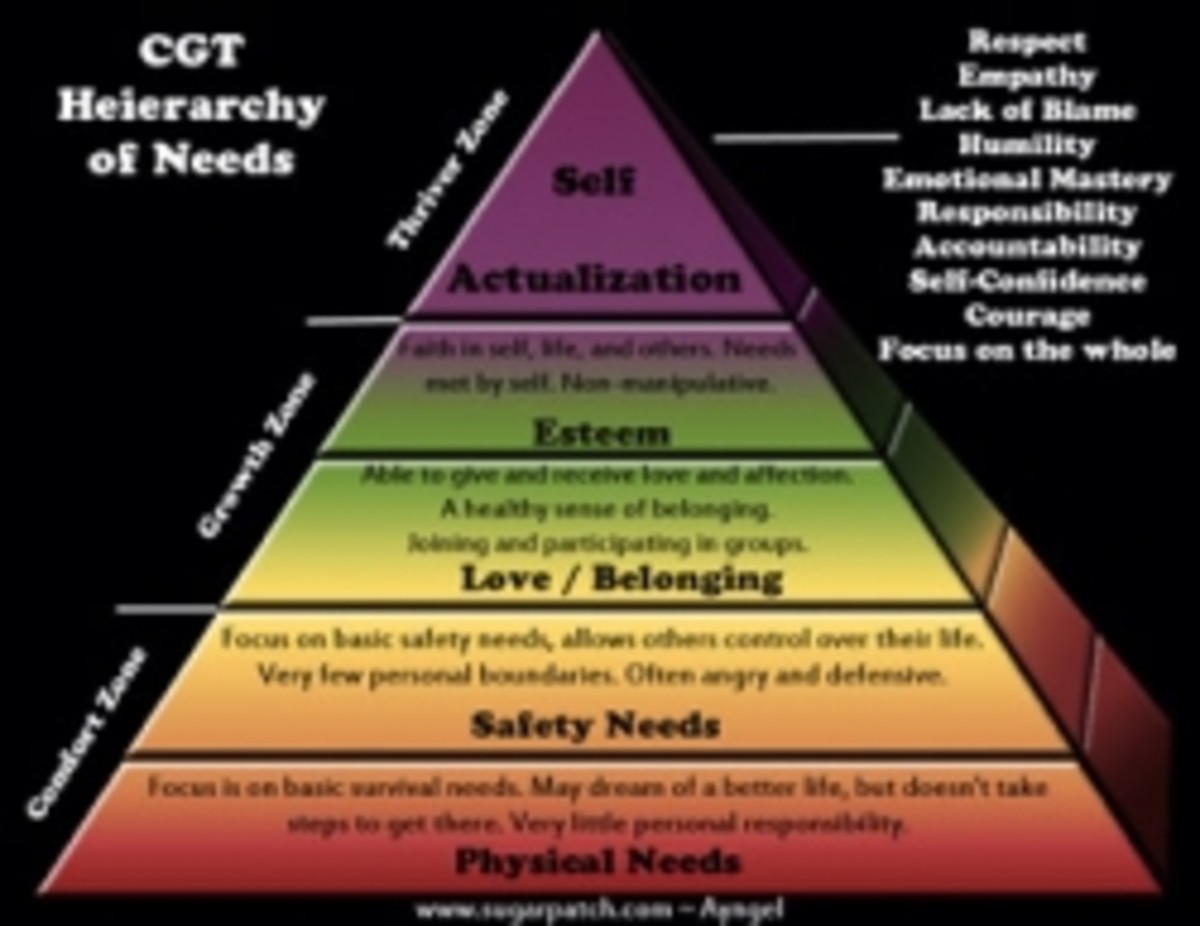Sentence Sermons (Christian Inspiration) #60 --- Self-Pity (Set No.2)
Quotations on Self-Pity (Set No. 2)
Have you ever had the feeling that the world was against you? That nothing could go right today? That perhaps the biggest mistake you made today was getting out of bed this morning? Perhaps you've even become a bit depressed over a period of time. I think most of us have had those experiences on occasion. However, much of this kind of feeling is due to a little problem called self-pity. Things start to go wrong, self-pity creeps in, and soon we are having a little pity party for ourselves. From the pity party things evolve into angry reactions, bitterness, hostility toward others, and on it goes. Soon, not only are things not going well, but no one else wants to be around us. At this point we have the makings of a lonely, angry person.
The apostle Paul, in writing to the Thessalonian church, gave a little one-line admonition to deal with this kind of problem. He said, "In everything give thanks." (1 Thessalonians 5:18.) Notice he did not say, "for everything give thanks," but "in everything give thanks."
You see, Paul recognized that in every situation there is still something to be thankful for. By doing so, we take our eyes off the problem and focus on some positive aspect of our lives. No matter what kind of situation we find ourselves, we can still find something for which to be thankful. Even in that negative situation we can give thanks for other positive aspects of our lives. So you had a flat tire. Thank God that you have a job. So you had a squabble with your marriage partner this morning. Even though your marriage may not be all that you want it to be, thank God that you have the relationship with which you can work. So you are in the hospital. Have you taken time to thank God that you are alive, that you can enjoy the beautiful sunshine, and the beauty of life itself?
Let's not get caught in the trap of self-pity. Rather, as Paul suggests in the Scripture, in everything–every situation--give thanks for the positive aspects. In so doing, we turn our attention from the negative situations which sap our strength, energy and joy, to focus on those positive aspects of our life, thereby reinforcing our joy of life.
—Leon Thiessen, Amarillo Daily News, Amarillo, Texas, Feb. 9, 1980.
What pity is so pitiable as self-pity–one of the most stubborn of sentiments. Advice, encouragement, abuse have no effect whatever. Self-pity is the sweetest fruit of self-love. No one who entertains it can willingly be robbed of its sweetness.
There is a growing dividend, as the world gets smaller and we have more neighbors, for enough sorrow to satisfy self-pity.
It is a striking fact that despair and vanity rise from the same source. Both are forms of self-worship.
Here is the recipe for getting rid of self-pity. When you have a pint of desperation, add a cupful of adaptation to the unexpected–a good-sized pinch of willingness to do anything to help yourself–two handfuls of hard work–the yeast of faith and hope–then place them in the slow oven of patience.
—Carlysle H. Holcomb, Dallas Morning News, Dallas, Texas, April 21, 1953.
Self-pity is a cancer which often claims lives--as happens in [suicides]--but in thousands of other cases it merely makes for maladjusted individuals, unhappy persons who make life miserable for themselves and those about them.
Those forces which result in self-pity are quite real. They are not necessarily imaginary. A person is lonely for one of a dozen reasons. His loneliness is real. It isn't just in his mind. It causes him unhappiness and suffering.
A person is needy. He lacks the economic resources to provide even the necessities of life. Bills stack up as a result of such necessities as food, medical and hospital bills.
Another person is born with physical or personality deficiencies. She grows up a wallflower. Her friends are popular and sought after. Meanwhile, she is passed by.
Still another works hard in his struggle for success. But he is plagued with one reverse after another.
The self-pity which results from these and other situations, if not checked, can ruin lives. But unlike most cancers, it can be treated--and cured!
A person afflicted with this malady might consider several facts of life.
First, when considered in its totality, life has its compensations and tends to equalize itself. True, when viewed from too close a position where one can see only days instead of years or perhaps eternity, one's lot can appear quite dismal. All of us have experienced days and even weeks which, if typical of one's life, would make that life unbearable. But when we view the entire life, we find that for every unpleasant day we also have 10 or perhaps 50 pleasant ones. Into every life, some rain must fall. And it takes those rainy days to give meaning to those filled with sunshine.
Also, when we view our troubles and crosses, then see our neighbor an apparently trouble free existence, it doesn't necessarily mean that things are as they seem. Perhaps the neighbor is doing a better job concealing his troubles from public view--or perhaps his rainy day won't arrive until tomorrow.
Where one is lacking in monetary riches, perhaps the other is lacking in health, in marital happiness or in peace of mind. Where one is rich with friends or the capacity to appreciate and enjoy life, the other may be completely lacking in these blessings.
Just as talents vary in type, so do burdens. Over a lifetime, few can charge that they have suffered discrimination from life.
Knowledge that the sun will shine tomorrow does not always bring comfort during today's rain. But it is possible to make lemonade out of the rain, to skin the wolf at the door and make a rug out of his hide.
The person suffering from loneliness will lose his loneliness when he decides to supply the need of his lonely neighbor for companionship and friendship. The person without shoes will forget his infirmity when he thinks of the one who has no feet, and especially when he seeks to assist the footless one.
He who grieves because he can't buy a new car like of his neighbor will become satisfied with his present vehicle when he thinks of those who have no car at all.
Self-pity is for only one person--the man or woman who has never received even one blessing from Almighty God.
—H.M. Baggarly, Tulia Herald, Tulia, Texas, Feb. 5, 1959.
Self-pity is common to all of us. Perhaps our plans have been thwarted or God's providence seems to frown upon us.
Self-pity usually spins off depression. ... We can in prayer if we avoid viewing our circumstances in our little closet world. Come before the throne of Christ! Our lives are part of a great and wonderful plan of God. Therefore prayer must lift us out of self-pity.
Again, prayer must be mixed with a concept of grace. We deserve the worst, but expect deliverance through Jesus Christ. Grace gives the victory over self-pity.
Come to God with thanksgiving in Jesus Christ. ... Rejoice in Him as your Lord. Thanksgiving wipes out self-pity.
Last, but not least, a busy life can defeat self-pity.
—Randall James Chesson, Lake Charles American Press, Lake Charles, La., May 14, 1983.
Self-depreciation will prove to be canker in the disposition.
—Ernest C. Wareing, Western Christian Advocate, Cincinnati, Ohio, May 26, 1927.
There are those who shut themselves up with their griefs and nurse their sorrows. There is a selfishness of suffering as selfish as the selfishness of sin. An excessive grief for the dead affects the living. A man in this constant state of self-pity is soon despised by others. A morbid sympathy for self prevents people from girding themselves for the battle of life.
—William P. King, The Atlanta Constitution, Atlanta, Ga., Jan. 22, 1928.
It is difficult for some of us to learn that simplicity is one of the basic qualities of beauty. When gaudiness in dress is coupled with bad manners and evil motives, it is difficult to estimate the harm it can do, especially to people who are ill.
It is never a compliment to oneself when we purposely accentuate inferiority feelings in other people. This is the essence of childishness, immaturity, and unrest of soul.
Our Lord did not live the marvelous life which he lived on this earth in order to make us feel inferior nor to receive sadistic pleasure from our littleness as compared with His greatness. He lived in order that He might lift us up to His level. Our daily human relationships would be vastly more Godlike if we could remember this simple principle from day to day.
—Harold L. Hawkins, Baptist Message, Alexandria, La., Jan. 27, 1955.
The most deadly poison for the mind is self-pity.
—Phil Conley, The Clarion-Ledger, Jackson, Miss., July 1, 1947.
The power to comfort others does not come from consoling yourself.
—Henry F. Cope, Chicago Tribune, Chicago, Ill., Nov. 28, 1909.
Self-pity is the extreme opposite of self-help.
—A.J. Gearheard, The Shreveport Times, Shreveport, La., Feb. 3, 1924.
It seems that many people thrive on the feeling that they are being hated. They use the hate of others as a sort of salve for themselves with which they apply self-pity and personal praise. It pays to learn why others hate you, for they may be right.
—A.J. Gearheard, The Shreveport Times, Shreveport, La., Nov. 9, 1924.
Thinking of your troubles and sympathizing with yourself is another way of pouring vinegar into your disposition. You will soon sour good and proper on your friends and all the world.
—A.J. Gearheard, The Shreveport Times, Shreveport, La., May 22, 1927.
The one who indulges in self-pity finds happiness in being neglected.
—H.M. Baggarly, Tulia Herald, Tulia, Texas, May 23, 1963.
Self-pity is a weakness. The abuses one suffers endanger the citadel of self-respect. Self-respect and self-pity are mutually destructive of each other. Self-respect holds itself up against its misfortunes and climbs over its difficulties, but self-pity seeks an antidote and a compensation.
—F.C. McConnell, Christian Index, Atlanta, Ga., Aug. 12, 1920.
The secret of a happy life is to learn to love one's work and to give it one's best. I don't know anything that brings more contentment in life than to be able to wake up in the morning and look forward eagerly to the task ahead. Nor is there any greater satisfaction than to pause at the close of the day with a feeling of work well done.
In that way one loses himself for others. This touches upon the great principle enunciated by the Savior when He said, "He that loseth his life for my sake shall find it." (Matthew 10:39.) This is paradoxical but true. It is applicable to all of us no matter what situation in life one may fall.
He who will follow that ideal will have little or no time for self sympathy. Self sympathy is, in most cases, a joy killer. It is fundamental that to make others happy brings happiness to self.
—David O. McKay, Deseret News, Salt Lake City, Utah, Sept. 11, 1954.
The gift of appreciation is always the mark of a noble character. The constant habit of depreciation is the sign manual of littleness. To depreciate is not so much the following out of the desire to criticize as it is the tendency to give in to an inferiority complex. Generous natures are always self-forgetful. They have the heart touches of peace and so have hearts at leisure from themselves.
—F.O. Mixon, Christian Index, Atlanta, Ga., April 20, 1939.
There is the great danger of self-conceit, but at the opposite end of the line there is the equally great fault of self-depreciation.
—Floyd Poe, Dallas Morning News, Dallas, Texas, Nov. 9, 1949.
Remember that self-serving is self-destructive. ... Self-pity is worse than cancer.
—Sam C. Reeves, Baptist Message, Alexandria, La., July 20, 1972.
Self-pity is the most melancholy companion life can choose. —Earl Riney, Church Management, Cleveland, Ohio, October 1940. There is many a human ostrich going through life who thinks he is concealing his self-disapproval from others.
—Earl Riney, Church Management, Cleveland, Ohio, January 1955.
What makes life seem cruel is too often only an overdose of self-pity.
—Roy L. Smith, Tampa Morning Tribune, Tampa, Fla., March 30, 1933.
Nothing is so fatal to happiness as self-pity.
—Roy L. Smith, Tampa Morning Tribune, Tampa, Fla., Oct. 31, 1941.
No matter which area of life you are talking about or dealing with, sooner or later you will hear the metaphor of the pity pot.
It came to my attention for the first time in the powerful company of recovering alcoholics in Alcoholics Anonymous meetings.
There, perhaps as in no other context, the pity pot is a graphic, striking phenomenon. In those meetings another way of saying it was "The poor me's."
A "pity party" is another way of expressing the same thing.
However, more accurately, in order to have a pity party you would have to have at least a few individuals sitting on their pity pots. As a matter of fact, such pity parties are very much in evidence.
Psychological paralysis is the first child of the pity pot; for, the more you sit on your pity pot, the less you are inclined to get off it.
At first you are reluctant to get off your pity pot because you fancy that self-pity feels so soothing. Later, you are afraid to move off because self-pity has robbed you of most of your courage and security away from the pity pot.
Infections, pervasive negativism is the second child of the pity pot.
The more you turn inward and meditate on the foul excrement in your pity pot, the more negatively you view yourself, your surroundings and the world at large.
Curiously, insensitivity is the third child of the pity pot. That appears contradictory to the one who is on the pity pot in the first place because of his/her sensitivity to various kinds of hurt.
Yet, it remains consistently true that, as long as you sit on your pity pot, you grow more and more oversensitive to the hurts and needs of others.
While the pity pot sensitizes you to a fault to your own needs and desensitizes you to the needs and feelings of others, it teaches you to sulk and to be a wet blanket to everyone, because it makes you perceive yourself as the long ranger in suffering and need.
Get off your pity pot, even if it is just sympathy or empathy which you want.
Just as no one likes a cry baby, so does no one like a moper or defeatist.
You will receive precious little sympathy or empathy as long as you sit on your pity pot, but, as soon as you hop up and try to do something about your situation, people will find you tolerable and begin to affirm you.
As long as you sit on your pity pot, you will see no solutions to any of your problems that appear above the horizon because solutions will not come to you; you must go to them.
You will also find that people will not come to you either, except the feckless few who want to become self-destructing members of your pity party.
Get off your pity pot and, with God's help, you will find a way to chart a course through the dire straits you are in.
Get off your pity pot and, no matter how badly you have been hurt, no matter how much you have been slighted, no matter how often and how miserably you have failed, you will find strength to carry on.
Perhaps you are in the latter stages of your pity pot; not only hurt frequently and deeply, but now also the listless victim of attempted remedies through the deadening effects of chemicals.
Get off your pity pot and view the rest of the world as it really is.
The decomposing offal in your pity pot is neither the way nor the truth.
Your way in life and the truth which you seek can be found exclusively through Jesus, the centerpiece of the universe: "I am the way, and the truth, and the life." (John 14:6.)
—Jerome LeDoux, The Church Today, Alexandria, La., June 6, 1984.
Oftentimes it is the most trivial deed of kindness, yet it is just as good as a great big deed when it comes to curing one of self-pity. The secret of the cure is just to get your thoughts on someone else. When you are thinking of others and doing for others you simply haven't time to ponder over your own grievances.
One cannot feel sorry for one's self when doing and thinking of others and there are always so many things we can find to do and say for those "others" if we make the effort. The happiest people are truly the ones who spend the least time and thought upon themselves. In doing for others we lose ourselves and our worries and perplexities, and every deed and thought, no matter how trivial, brings to us a rich harvest of content and happiness. Do something for someone else--thinking of someone else--help someone. Don't spend so much precious time thinking of yourself. It only makes one discontented.
—Harriot Russell, Houston Daily Post, Houston, Texas, April 13, 1916.
It is such a good old world in spite of the many unlovely things in it that there is never any reasonable excuse for any one of us to indulge in that weakest of all human traits, self-pity.
Not only is it detrimental to the development of the highest and best that is in us, but it renders us more or less unattractive to others. The person who is always feeling so inexpressibly sorry for self never makes a strong appeal to our sympathy.
The woman or man who stoops to overindulgence of this sorry-for-self feeling is really attempting mental suicide, for it makes one little, weakens one, narrows one till there is but an infinitesimal part left of the fineness, the bigness, the breadth of thought and action which should be ours. It stifles the heart quality, too. We are thinking, as the person who is so very, very sorry for self has neither time nor eyesight for troubles or sorrows, the happiness or joys, of anyone else.
Let's make an effort–a great big straight-from-the-heart effort--never to allow ourselves to lose sight of the fact that our individual case–our condition in life–no matter how sad or difficult--has many counterparts. Let's strive never to get into the way of believing that our own little worries are the very biggest worries in the world.
This big, shiny old earth–and oh! it is a gladsome place if we will just refrain from building walls about ourselves so that we cannot get a clear vision–is filled, notwithstanding the loveliness of it, with other struggling mortals whose hearts have sorrows to bear, who work just as hard and oftentimes harder--from our narrow little corner we cannot always gauge in its entirety the amount of work that someone else may accomplish in the day's round--who have just as many big problems to face and solve, just the same dreams, hopes, ambitions, just the same disappointments, obstacles, disillusions to meet.
It isn't a one man's world or a one woman's world when it comes to life in its fullest, deepest meaning, so let's not allow ourselves to sit, figuratively speaking, on a bit of an island of self-pity, entirely surrounded with dismal view of our own personal problems and grievances. Let's pray for a different sort of an horizon where something of the heartaches and problems of others may be silhouetted. It will help us in many ways and most of all it will make us bigger of heart and mind and soul.
—Harriot Russell, Houston Daily Post, Houston, Texas, Jan. 17, 1916.








